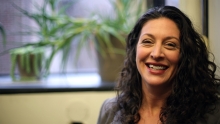"Concerns around sex and gender have divided American religious groups for more than a century, but sociologist Melissa Wilde wanted to understand which hot-button issue caused the first chasm.
“Instead of taking it as a given that progressive religious groups and secular Americans were progressive on issues like abortion, feminism, and contraception and that conservatives were conservative, I wanted to understand how it happened,” says Wilde, an associate professor in Penn’s Department of Sociology in the School of Arts and Sciences who studies the sociology of religion.
Following a hunch, she started digging, ultimately examining more than 50 years of periodicals for each of more than 30 of America’s most prominent religious groups. Together these groups represented more than 90% of religious Americans at that time.
As she suspected, birth control topped the list for most divisive issue, spurred by nine religious groups that liberalized in the late 1920s and early 1930s, rather suddenly calling for the legalization of contraception. After nearly a decade of research that included help from more than 60 Penn undergrads and graduate students, Wilde published her book “Birth Control Battles: How Race and Class Divided American Religion.”
Penn Today spoke with her about her book and what turns out to be a dark chapter in a narrative often described as a great success story in the history of women’s rights."
Read more at Penn Today.

 The Program in Gender, Sexuality, and Women’s Studies
The Program in Gender, Sexuality, and Women’s Studies